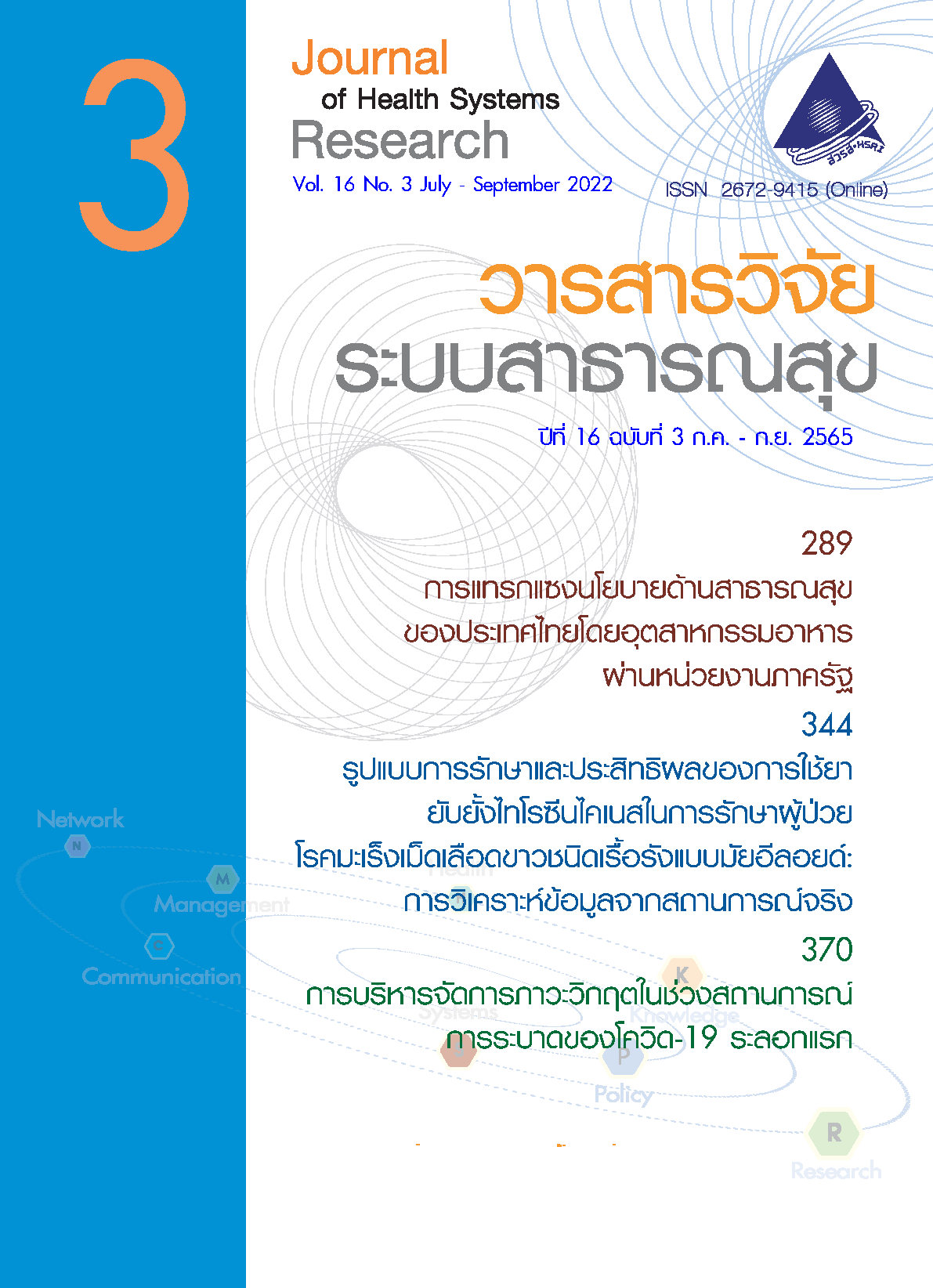สาเหตุของการส่งเงินสมทบไม่ต่อเนื่องของผู้ประกันตนตามมาตรา 40: การศึกษาเชิงคุณภาพ
คำสำคัญ:
สาเหตุการขาดส่งเงินสมทบ, ผู้ประกันตน ตามมาตรา 40, ประกันสังคม, การศึกษาเชิงคุณภาพบทคัดย่อ
การศึกษาเชิงคุณภาพนี้มีวัตถุประสงค์เพื่อศึกษาสาเหตุที่ทำให้ผู้ประกันตนตามมาตรา 40 ขาดส่งเงินสมทบหรือส่งเงินสมทบไม่ต่อเนื่อง โดยเก็บข้อมูล 2 วิธี คือ 1) การสัมภาษณ์ทางโทรศัพท์กับอาสาสมัครแรงงานและเครือข่ายประกันสังคมตามมาตรา 40 จำนวน 9 คน จากลำพูน บุรีรัมย์ ขอนแก่น กรุงเทพมหานคร และภูเก็ต และผู้ที่มีประสบการณ์เป็นผู้ประกันตนตามมาตรา 33, 39, และ 40 และมีส่วนช่วยส่งเสริมการเข้าถึงหลักประกันทางสังคมจำนวน 1 คน จากกรุงเทพมหานคร และ 2) ทบทวนความเห็นเกี่ยวกับประกันสังคมตามมาตรา 40 ที่ประชาชนเขียนเผยแพร่ในสื่อออนไลน์ระหว่าง พ.ศ. 2559–2564 ผลการศึกษาพบว่า สาเหตุและอุปสรรคของการขาดส่งเงินสมทบหรือส่งเงินสมทบไม่ต่อเนื่อง ประกอบด้วยขั้นตอนและเอกสารในการเบิกเงินยุ่งยาก จำนวนเงินบำเหน็จน้อยกว่าที่คาดหวังไว้ สิทธิประโยชน์ไม่เท่าเทียมกับประกันอื่น การไม่ทราบถึงผลกระทบของการขาดส่งเงินสมทบ การไม่ทราบว่าจะต้องทำอย่างไรหลังขาดส่งเงินสมทบ การหลงลืมวัน ความไม่สะดวกส่งเงินสมทบตามช่องทางที่มีอยู่ และการไม่มีเงินส่ง ข้อค้นพบนี้สามารถนำไปพัฒนาแนวทางในการลดปัญหาและอุปสรรคในการขอรับประโยชน์ทดแทนเพื่อป้องกันไม่ให้ผลกระทบขยายวงกว้างไปสู่แรงงานนอกระบบที่ยังไม่เข้าระบบประกันสังคมและผู้ประกันตนที่ยังไม่เคยขอรับประโยชน์ทดแทน แนวทางการสื่อสารสร้างความตระหนักถึงผลกระทบของการขาดส่งเงินสมทบ และระบบแจ้งเตือนและช่องทางการส่งเงินสมทบที่เข้าถึงผู้ประกันตนในพื้นที่นอกเขตเมือง
เอกสารอ้างอิง
The Royal Decree Prescribing Criteria and Rates of Contribution Payments, Types of Benefits and the Rules and Conditions of the Right to Receive Benefits for the Person Applying for the Self-Insurance [Article 20], B.E. 2561 (2018). The Royal Thai Government Gazette Volume 135, Section 19 Kor. (Mar 27, 2018). (in Thai)
Research and Development Division. Factors associated with ineligibility to receive sickness benefit among insured persons under the Social Security Act’s Article 40: 2018–2020. Full Report. Nonthaburi: Social Security Office; 2021. (in Thai)
Research and Development Division, Social Security Office. Numbers of insured persons. March 2021. Nonthaburi: Social Security Office; 2021. (in Thai)
Zhang, B, Vos, M. Social media monitoring: aims, methods, and challenges for international companies. Corporate Communications: An International Journal 2014;19(4):371-83.doi:10.1108/CCIJ-07-2013-0044.
The National Commission for the Protection of Human Subjects of Biomedical and Behavioral Research. The Belmont Report. Translated by Chokwiwatana W, and Posayanon T. Nonthaburi: Institute for the Development of Human Research Protections (IHRP): 2008. (in Thai)
The Royal Decree Prescribing Criteria and Rates of Contribution Payments, Types of Benefits and the Rules and Conditions of the Right to Receive Benefits for the Person Applying for the Self-Insurance [Article 40], B.E. 2554 (2011). The Royal Thai Government Gazette Volume 128, Section 34 Kor. (May 11, 2011). (in Thai)
Social Security Office. The Social Security Office (SSO) service-user satisfaction in 2019. Nonthaburi: Social Security Office; 2019. (in Thai)
Mirach TH, Demissie GD, Biks GA. Determinants of community-based health insurance implementation in west Gojjam zone, Northwest Ethiopia: a community based cross sectional study design. BMC Health Serv Res. 2019;19(1):544. doi:10.1186/s12913-019-4363-z.
Otieno PO, Wambiya EOA, Mohamed SF, Donfouet HPP, Mutua MK. Prevalence and factors associated with health insurance coverage in resource-poor urban settings in Nairobi, Kenya: a cross-sectional study. BMJ Open. 2019;9(12):e031543. doi: 10.1136/bmjopen-2019-031543.
Chanduaywit W, Chonpitakwong B. Informal workers: a case study of roadside shops. Thailand Development Research Institute (TDRI). 2020. [Internet]. [cited 2021 Mar 25]. Available from: https://tdri.or.th/2020/03/informal-labor-hawker-highway/ (in Thai)
Social Security Office. The Social Security Office (SSO) service-user satisfaction in 2018. Nonthaburi: Social Security Office; 2018. (in Thai)
National Statistical Office. The informal employment survey 2020. Bangkok: Ministry of Digital Economy and Society; 2020. (in Thai)
Dong H, Kouyate B, Cairns J, Sauerborn R. Differential willingness of household heads to pay community-based health insurance premia for themselves and other household members. Health Policy Plan. 2004;19(2):120–6. doi: 10.1093/heapol/czh014.
Mahmood SS, Hanifi SMA, Mia MN, Chowdhury AH, Rahman M, Iqbal M, et al. Who enrols in voluntary micro health insurance schemes in low-resource settings? Experience from a rural area in Bangladesh. Glob Health Action. 2018;11(1):1525039. doi: 10.1080/16549716.2018.1525039.
Kotoh AM, Aryeetey GC, Van der Geest S. Factors that influence enrolment and retention in Ghana’ national health insurance scheme. International Journal of Health Policy and Management. 2018;7(5):443-54. doi: 10.15171/ijhpm.2017.117.
ดาวน์โหลด
เผยแพร่แล้ว
รูปแบบการอ้างอิง
ฉบับ
ประเภทบทความ
สัญญาอนุญาต
ลิขสิทธิ์ (c) 2025 วารสารวิจัยระบบสาธารณสุข

อนุญาตภายใต้เงื่อนไข Creative Commons Attribution-NonCommercial-NoDerivatives 4.0 International License.
วารสารวิจัยระบบสาธารณสุขอยู่ภายใต้การอนุญาต Creative Commons Attribution-NonCommercial-NoDerivatives 4.0 International (CC BY-NC-ND 4.0) เว้นแต่จะระบุไว้เป็นอย่างอื่น




